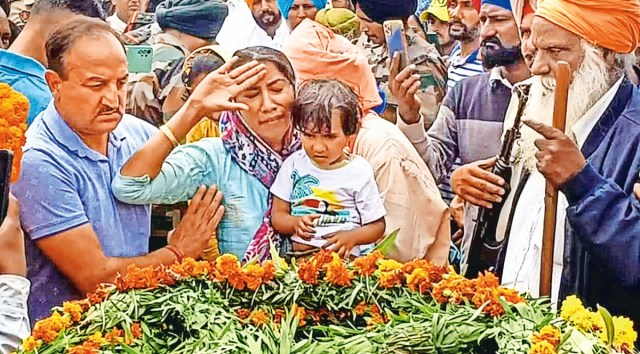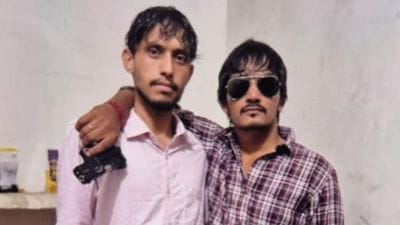Northern Commander reviews security at Poonch terror attack site, Army set to order internal probe
Sources said the initial search operation was partially suspended Saturday in inhabited areas considering Eid celebrations, and it will resume in a day. The cordon continued to be in place.
 Wife and daughter of Sepoy Harkrishan Singh, who was killed in Poonch’s terror attack, salute his mortal remains, in Batala on Saturday. PTI
Wife and daughter of Sepoy Harkrishan Singh, who was killed in Poonch’s terror attack, salute his mortal remains, in Batala on Saturday. PTI Northern Army Commander Lt General Upendra Dwivedi and NSG officials on Saturday visited the site of Thursday’s terror attack in J&K’s Poonch district in which five soldiers were killed, and “reviewed the operational situation”, even as sources told The Sunday Express that the Army will likely order an internal inquiry to examine the circumstances of the incident to check any probable lapses.
Sources said the initial search operation was partially suspended Saturday in inhabited areas considering Eid celebrations, and it will resume in a day. The cordon continued to be in place.
A massive combing and search operation involving nearly a dozen RR companies, drones and dogs are underway at the site.
On Thursday, militants had ambushed a truck near Bhatta Durian, on Bhimber Gali-Surankote Road of border Poonch district. Five Army personnel were killed and another was seriously injured in the incident.
Lt General Dwivedi, accompanied by GOC of Nagrota-based 16 Corps, Lt General Sandeep Jain, visited the spot and was briefed on actions undertaken so far, officials said. They said Lt Gen Dwivedi “exhorted the troops to be steadfast in their resolve”.
Sources said the visiting NSG officials were from its National Bomb Data Centre, which records and analyses bomb incidents.
Meanwhile, massive searches are on Bhatta Durian forests. Traffic on BG-Surankote stretch of Rajouri-Poonch highway remained suspended for the third day on Saturday, with police and Army personnel diverting all Poonch-bound vehicles on the road to Mendhar.
Sources said the investigation so far points towards the involvement of Jaish-e-Mohammad, as its offshoot — the People’s Anti Fascist Front — has claimed responsibility for the attack. They appear to have been helped by Lashkar-e-Taiba (LeT) in carrying out the attack, sources said.
Three to four terrorists believed to be involved in attack also appear to be well-versed with the topography of the area, sources say. The Bhatta Durian forests, 4-5 km in aerial distance from the LoC in Balakote sector, are not only very dense but vast as well.
The area has been a major infiltration route to Kashmir for militants into Balakote from Pakistan side, as dense foliage, caves and the hilly terrain provide an easy cover. Through these, sources said, they move to Behramgala on Mughal Road, and finally to Shopian in Kashmir Valley.








